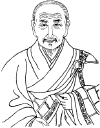THE SIXTH PATRIARCH OF THE WEI YANG LINEAGE,
THE FIFTEENTH PATRIARCH IN CHINA, AND THE FORTY-SECOND PATRIARCHAL
DESCENDENT FROM SAKYAMUNI BUDDHA, DHYANA MASTER CHIH CH’IEN
Text and Commentary by
Tripitaka Master Hsuan Hua
Translated
by Disciple Bhiksu Heng Ching
The
sixth patriarch of the Wei Yang School was Dhyana Master Chih Ch’ien
of San Chiao Mountain. His name means “Modest Resolve’,’ and in
accord with his name he was not arrogant. Reckoned from the time of
Bodhidharma, he is the fifteenth Patriarch, if counted from the time of
Sakyamuni
Buddha, he is the forty second. He was Dharma Master Te Shao’s successor
and was his “room entering disciple.”
Not just anyone is allowed into the abbot’s quarters. Only those who have truly received his dharma can enter and be called “room entering disciples.” Dharma Master Chih Ch’ien was such a person and succeeded to the dharma seat. He cultivated dhyana samadhi, always sitting and never lying down. Quite often he would sit in meditation for several months, not eating or drinking and not arising from is seat. Because of the way he worked at his cultivation, many lay people believed in him and took refuge with him.
Once a cultivator who had left home requested Dharma from him: ”What,” he said, “is the Buddha?”
“Quickly, bow three times I” replied the master.
On
hearing this the cultivator bowed three times and the master said, “With
one shove you turn.”
What is the meaning of all this? The question posed was, “What is Buddha?” “Quickly bow three times” means that the bowing is just one becoming a Buddha. After the monk bowed the master’s words meant, “ Now, you have opened enlightenment: I just give you a little shove, and you understand.”
The praise of Master Chih Ch’ien of San Chiao Mountain says,
“What
is Buddha?
Quick,
bow thrice.
A single shove, the change occurs, Just speaking of
it is strange.
If there’s the slightest hesitation,
It’s just black tacky lacquer.
San Chiao Mountain is high
When the wind blows, the grasses bend.”
The fifth and sixth lines mean that if there were the slightest bit of hesitation, for example thinking, "Oh, bowing three times is Buddha?”, there would be no change. "Tacky lacquer” represents' stupidity the "black ch’i barrel”. This word "tacky" originally means “not quick” but here it should be explained as "stupid."
In the final two lines, the grasses represent everyone in the four assemblies of the Buddha’s disciples, those who have left home and householders. The wind which passes refers to the high virtue of Master Chih Ch’ien. In the Four Books there is a saying, “The superior man is wind, the common man is grass. When the wind blows, the grasses bend.” In this context the superior man is one of great virtue, the common man one of small virtue. It does not refer to petty or mean people. Ordinary people, the Master’s disciples, are all compared to the grasses which bend at the approach of the wind.
